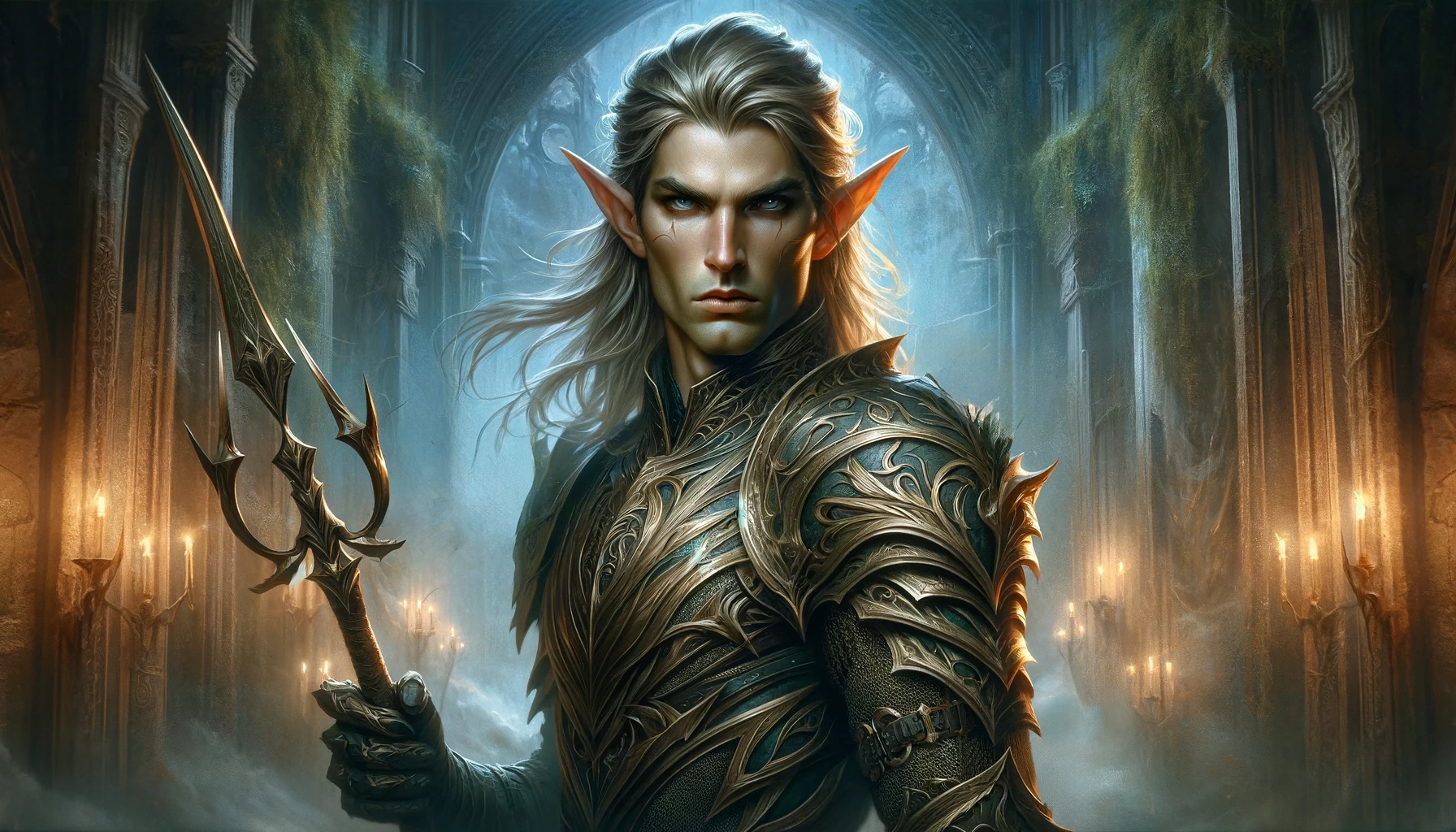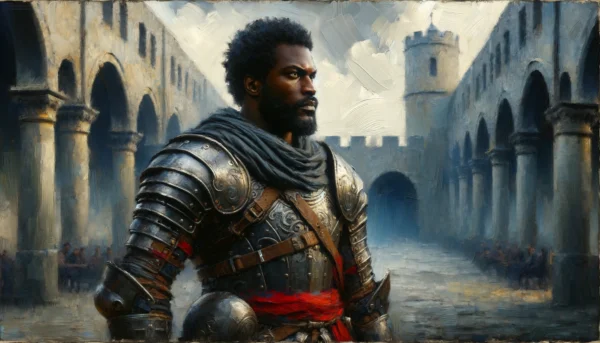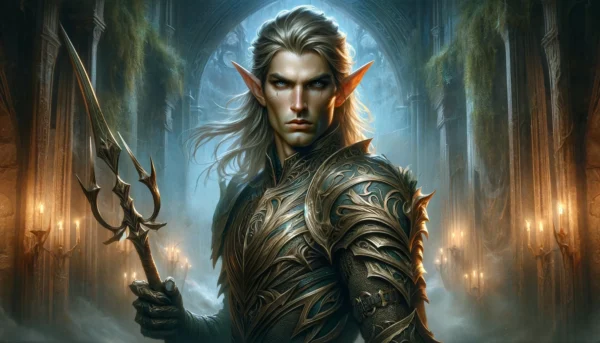
Fighter: Spellblade
Spellblade
Spellblade
Spellblades are warriors who embrace both steel and spell, channeling arcane energies through their weapons to bolster their attacks and confound their enemies. They’re a versatile fighting force, equally comfortable on the front lines or casting spells from the rear.
Subclass (Martial Archetype) of Fighter
Fighters are skilled and disciplined warriors who have honed their combat prowess through rigorous training and experience on the battlefield. Masters of a wide range of weapons and armor, they excel in both offense and defense. Fighters can specialize in various fighting styles, granting them unique bonuses, such as improved accuracy or the ability to wield two weapons simultaneously. As they advance, fighters gain Extra Attacks, allowing them to strike multiple times in a single turn, making them formidable combatants.
Class Features
As a spellblade, you gain the following features.
Hit Points
Proficiencies
Armor: Heavy Armor, Light Armor, Medium Armor, Shield
Weapon: Martial Weapon, Simple Weapon
Saving Throw: Strength, Constitution
Skills: You have 2 of the following skills: Acrobatics, Animal Handling, Athletics, History, Insight, Intimidation, Perception, Survival.
Starting Gold
You start with 5d4 x 10 gold pieces (GP) unless you choose to take the equipment below
Starting Equipment
You start with the following equipment, in addition to the equipment granted by your background:
- (a) chain mail or (b) leather armor
- longbow
- (a) any martial weapon
- (a) shield or (b) any martial weapon
- (a) dungeoneer's pack or (b) explorer's pack
Spellblade Features Table
| LVL | Pro+ | Features | Cantrips Known | Spells Known | Spell Slots per Spell Level | ||||
|---|---|---|---|---|---|---|---|---|---|
| 1st | 2nd | 3rd | 4th | 5th | |||||
| 1st | +2 | Fighting Style, Second Wind | – | – | – | – | – | – | – |
| 2nd | +2 | Action Surge (one use) | – | – | – | – | – | – | – |
| 3rd | +2 | Spellcasting, Enchanted Strike, Martial Archetype | 2 | 3 | 3 | – | – | – | – |
| 4th | +2 | Ability Score Improvement | 2 | 3 | 3 | – | – | – | – |
| 5th | +3 | Extra Attack | 4 | 4 | 4 | 2 | – | – | – |
| 6th | +3 | Ability Score Improvement | 2 | 2 | 4 | 2 | – | – | – |
| 7th | +3 | Arcane Defense | 2 | 5 | 4 | 3 | – | – | – |
| 8th | +3 | Ability Score Improvement | 2 | 5 | 4 | 3 | – | – | – |
| 9th | +4 | Indomitable (one use) | 2 | 6 | 4 | 3 | 2 | – | – |
| 10th | +4 | Spellshatter | 3 | 6 | 4 | 3 | 2 | – | – |
| 11th | +4 | Extra Attack (2) | 3 | 7 | 4 | 3 | 3 | – | – |
| 12th | +4 | Ability Score Improvement | 3 | 7 | 4 | 3 | 3 | – | – |
| 13th | +5 | Indomitable (two uses) | 3 | 8 | 4 | 3 | 3 | 1 | – |
| 14th | +5 | Ability Score Improvement | 3 | 8 | 4 | 3 | 3 | 1 | – |
| 15th | +5 | Elemental Infusion | 3 | 9 | 4 | 3 | 3 | 2 | – |
| 16th | +5 | Ability Score Improvement | 3 | 9 | 4 | 3 | 3 | 2 | – |
| 17th | +6 | Indomitable (three uses), Action Surge (two uses) | 3 | 10 | 4 | 3 | 3 | 3 | 1 |
| 18th | +6 | Arcane Ascendancy | 3 | 10 | 4 | 3 | 3 | 3 | 1 |
| 19th | +6 | Ability Score Improvement | 3 | 11 | 4 | 3 | 3 | 3 | 2 |
| 20th | +6 | Extra Attack (3) | 3 | 11 | 4 | 3 | 3 | 3 | 2 |
Class Features at Level
Fighting Style
You adopt a particular style of fighting as your specialty. Choose one of the following options. You can’t take a Fighting Style option more than once, even if you later get to choose again.
Archery
You gain a +2 bonus to attack rolls you make with ranged weapons.
Defense
While you are wearing armor, you gain a +1 bonus to AC.
Dueling
When you are wielding a melee weapon in one hand and no other weapons, you gain a +2 bonus to damage rolls with that weapon.
Great Weapon Fighting
When you roll a 1 or 2 on a damage die for an attack you make with a melee weapon that you are wielding with two hands, you can reroll the die and must use the new roll, even if the new roll is a 1 or a 2. The weapon must have the two‑handed or versatile property for you to gain this benefit.
Protection
When a creature you can see attacks a target other than you that is within 5 feet of you, you can use your reaction to impose disadvantage on the attack roll. You must be wielding a shield.
Two-Weapon Fighting
When you engage in two-weapon fighting, you can add your ability modifier to the damage of the second attack.
Second Wind
You have a limited well of stamina that you can draw on to protect yourself from harm. On your turn, you can use a bonus action to regain hit points equal to 1d10 + your fighter level. Once you use this feature, you must finish a short or long rest before you can use it again.
Action Surge (one use)
You can push yourself beyond your normal limits for a moment. On your turn, you can take one additional action on top of your regular action and a possible bonus action.
Once you use this feature, you must finish a short or long rest before you can use it again. Starting at 17th level, you can use it twice before a rest, but only once on the same turn.
Spellcasting
Spell Slots
The Spellblade table shows how many spell slots you have to cast your spells of 1st level and higher. To cast one of these spells, you must expend a slot of the spell’s level or higher. You regain all expended spell slots when you finish a long rest.
For example, if you know the 1st-level spell animal friendship and have a 1st-level and a 2nd-level spell slot available, you can cast animal friendship using either slot.
Spells Known of 1st Level and Higher
At 3rd level, you choose a school of magic to specialize in: Abjuration, Evocation, or Transmutation. You learn two cantrips and three 1st-level spells from that school, drawn from the wizard spell list. You can cast these spells without needing material components and use Intelligence as your spellcasting ability.
The Spells Known column of the Spellblade table shows when you learn more wizard spells of your choice. Each of these spells must be of a level for which you have spell slots and must be from your chosen school. For instance, when you reach 5th level in this class, you can learn one new spell of 1st or 2nd level.
Additionally, when you gain a level in this class, you can choose one of the wizard spells you know and replace it with another spell from your school on the wizard spell list, which also must be of a level for which you have spell slots.
Spellcasting Ability
Intelligence is your spellcasting ability for your wizard spells. You use your Intelligence whenever a spell refers to your spellcasting ability. In addition, you use your Intelligence modifier when setting the saving throw DC for a wizard spell you cast and when making an attack roll with one.
Spell save DC = 8 + your proficiency bonus + your Intelligence modifier.
Spell attack modifier = your proficiency bonus + your Intelligence modifier.
Enchanted Strike
Also at 3rd level, when you hit a creature with a weapon attack, you can expend a spell slot to deal additional damage of the same type dealt by the weapon. The extra damage is 2d8 for a 1st-level spell slot, plus 1d8 for each spell level higher than 1st.
Martial Archetype
You choose an archetype that you strive to emulate in your combat styles and techniques, such as Champion. The archetype you choose grants you features at 3rd level and again at 7th, 10th, 15th, and 18th level.
Ability Score Improvement
You can increase one ability score of your choice by 2, or you can increase two ability scores of your choice by 1. As normal, you can’t increase an ability score above 20 using this feature. Alternatively, you can choose to take one Feat instead of the ability score increase.
Extra Attack
You can attack twice, instead of once, whenever you take the Attack action on your turn.
Ability Score Improvement
You can increase one ability score of your choice by 2, or you can increase two ability scores of your choice by 1. As normal, you can’t increase an ability score above 20 using this feature.
Arcane Defense
At 7th level, you can use your reaction to cast an Abjuration spell that you know when you or a creature within 30 feet of you is hit by an attack. The spell must have a casting time of 1 reaction or 1 bonus action.
Ability Score Improvement
You can increase one ability score of your choice by 2, or you can increase two ability scores of your choice by 1. As normal, you can’t increase an ability score above 20 using this feature. Alternatively, you can choose to take one Feat instead of the ability score increase.
Indomitable (one use)
You can reroll a saving throw that you fail. If you do so, you must use the new roll, and you can’t use this feature again until you finish a long rest.
Spellshatter
Starting at 10th level, when you hit a creature with a weapon attack, you can choose to dispel one spell affecting it. Make an Intelligence (Arcana) check against a DC of 10 + the spell’s level. On a successful check, the spell ends.
Extra Attack (2)
You can attack three times, instead of once, whenever you take the Attack action on your turn.
Ability Score Improvement
You can increase one ability score of your choice by 2, or you can increase two ability scores of your choice by 1. As normal, you can’t increase an ability score above 20 using this feature. Alternatively, you can choose to take one Feat instead of the ability score increase.
Indomitable (two uses)
You can reroll a saving throw that you fail. If you do so, you must use the new roll, and you can use this feature twice between long rests.
Ability Score Improvement
You can increase one ability score of your choice by 2, or you can increase two ability scores of your choice by 1. As normal, you can’t increase an ability score above 20 using this feature.
Elemental Infusion
At 15th level, when you cast an Evocation spell that deals damage, you can choose one damage type from the spell. For 1 minute, your weapon attacks deal an extra 1d6 damage of that type.
Ability Score Improvement
You can increase one ability score of your choice by 2, or you can increase two ability scores of your choice by 1. As normal, you can’t increase an ability score above 20 using this feature. Alternatively, you can choose to take one Feat instead of the ability score increase.
Indomitable (three uses)
You can reroll a saving throw that you fail. If you do so, you must use the new roll, and you can use this feature three times between long rests.
Action Surge (two uses)
You can push yourself beyond your normal limits for a moment. On your turn, you can take one additional action on top of your regular action and a possible bonus action.
You can use it twice before a short or long rest, but only once on the same turn.
Arcane Ascendancy
At 18th level, you can use an action to enter a state of arcane focus for 1 minute. While in this state, you can cast spells as bonus actions and your weapon attacks are considered magical for overcoming resistance and immunity to nonmagical attacks. Once you use this feature, you can’t use it again until you complete a long rest.
Ability Score Improvement
You can increase one ability score of your choice by 2, or you can increase two ability scores of your choice by 1. As normal, you can’t increase an ability score above 20 using this feature. Alternatively, you can choose to take one Feat instead of the ability score increase.
Extra Attack (3)
You can attack four times, instead of once, whenever you take the Attack action on your turn.
Martial Archetype
Different fighters choose different approaches to perfecting their fighting prowess. The martial archetype you choose to emulate reflects your approach.
Spellblade
Credits: Squire 5



